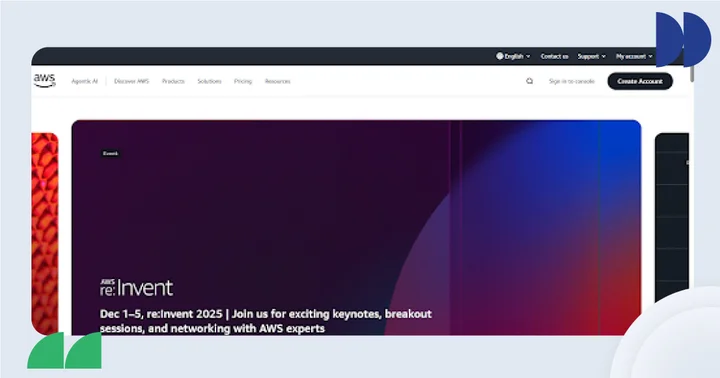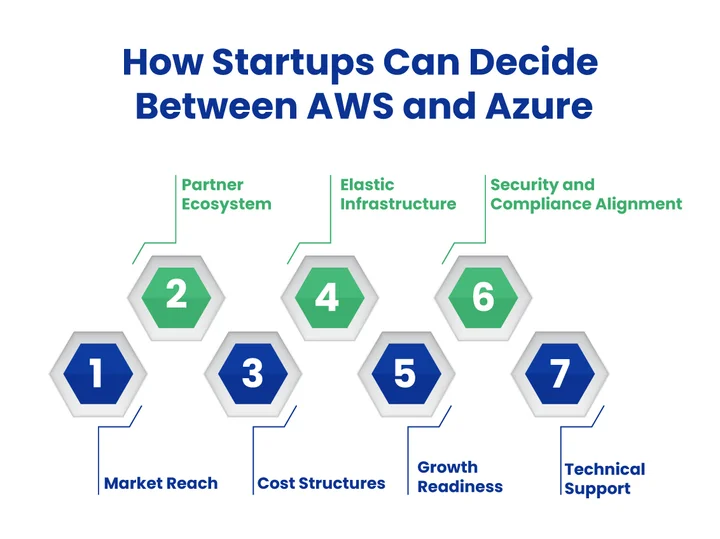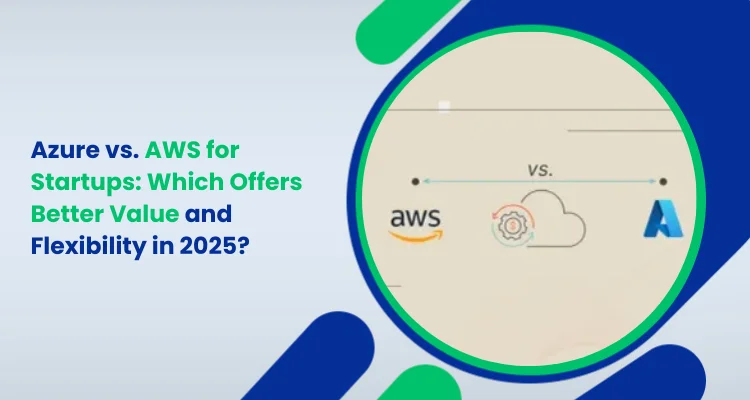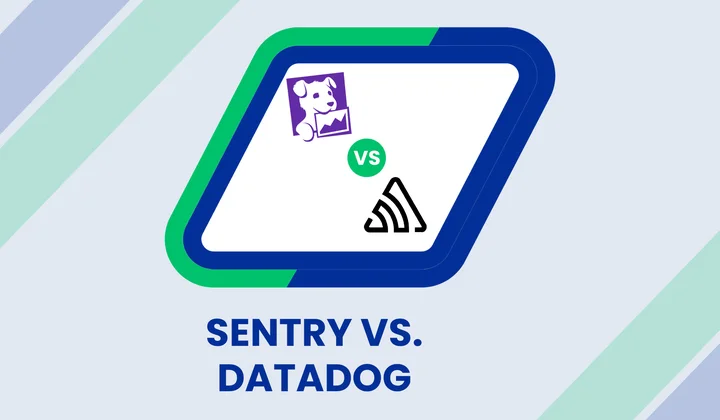Which cloud provider actually helps your startup grow without draining your budget?
In 2025, startups are expected to move fast, build lean, and scale smart, all while managing unpredictable workloads and tight resources.
AWS currently leads the global cloud infrastructure market with a 30% share, while Azure follows closely at 21%, as per Statista. Both platforms offer developer-friendly tools, startup credits, and robust infrastructure.
However, selecting one of them is more difficult than it may seem. What works for an enterprise may not suit an early-stage product team. What saves time in one sprint might introduce overhead in another.
That’s why it’s critical to evaluate not just features, but how well each platform supports fast iteration, DevOps pipelines, cost control, and future growth.
This blog breaks down AWS and Azure based on the things that matter most to startups, like pricing, tools, developer support, and how well each platform holds up in real-world scenarios.
So, you can pick the one that fits your product goals and growth plan in 2025.
Let’s begin with a quick overview of AWS and Azure to understand what each brings to the table for startups!
Table of Contents
AWS and Azure for Startups: An Overview
Cloud adoption is a strategic necessity. Among the top contenders, Amazon Web Services (AWS) and Microsoft Azure dominate the cloud computing space, offering powerful, scalable, and flexible infrastructure tailored to fast-moving startup environments.
To understand which provider fits your startup’s journey, we’re going to break down what each platform offers.
So, let’s get started!
What is AWS?

Amazon Web Services (AWS) is a leading cloud platform that provides on-demand computing resources, including storage, databases, networking, analytics, machine learning, and developer tools. Startups benefit from a vast library of over 200 services designed to support every stage.
The AWS Activate program is specifically built for startups, offering up to $100,000 in credits, free training, technical support, and architectural guidance. This makes AWS a strong choice for early-stage companies needing quick access to powerful infrastructure without heavy upfront costs.
Additionally, AWS supports containerization tools like Docker and Kubernetes, integrates with CI/CD tools (like GitHub Actions, Jenkins, and GitLab CI), and enables startups to scale globally in minutes.
Advantages of AWS for Startups
- Access to over 200 cloud services covering compute, AI/ML, and storage.
- AWS Activate offers up to $100,000 in credits, training, and support.
- Supports Docker, Kubernetes, and other containerization tools.
- Easily integrates with CI/CD tools like GitHub Actions and Jenkins.
- Global scalability with multi-region deployment options.
What is Azure?

Microsoft Azure is a comprehensive cloud computing platform that integrates seamlessly with Microsoft’s suite of enterprise tools, making it ideal for startups already using services like Microsoft 365, GitHub, or Visual Studio.
Moreover, Azure offers a wide range of services, including virtual machines, databases, DevOps pipelines, AI/ML models, and hybrid cloud capabilities. Through its Azure Founders Hub, startups receive cloud credits, access to free development tools, expert mentorship, and support.
Furthermore, Startups that prioritize integration with existing Microsoft tools, hybrid deployments, or plan to build enterprise SaaS products often find Azure to be the better fit.
Advantages of Azure for Startups
- Deep integration with Microsoft 365, GitHub, and Visual Studio.
- Azure Founders Hub provides cloud credits and development tools.
- Strong hybrid cloud support for on-prem and cloud environments.
- Built-in DevOps tools, AI services, and enterprise SaaS capabilities.
- Ideal for startups targeting regulated industries with compliance needs.
While features and credits play a critical role, a startup’s success also depends on the strength and reach of the platform’s ecosystem.
Now, we will compare them side by side based on the key factors that startups care about the most.
What are the Main Considerations while Choosing AWS and Azure for Startups?

In 2025, the choice of platform is influenced by pragmatic business requirements. The ideal platform should align with growth goals, product timelines, and funding realities. AWS and Azure both offer powerful capabilities, but they differ in pricing models, integration depth, and ecosystem support.
The global presence, partner networks, and overall impact of AWS and Azure are compared below!
1. Global Market Position and Ecosystem Strength
AWS and Azure are more than cloud vendors; they are ecosystem enablers driving global digital transformation. Their market dominance, partner networks, and enterprise adoption rates play a major role in shaping startup success stories worldwide.
Further, AWS holds the largest share in the global cloud infrastructure market and is known for its rapid innovation, massive scalability, and developer-first culture.
Backed by Amazon’s global data center footprint, AWS offers startups unmatched infrastructure reliability, global reach, and a thriving third-party marketplace.
Azure, in contrast, continues to gain momentum, especially among enterprises already embedded in the Microsoft ecosystem. Its strength lies in hybrid cloud capabilities, compliance-readiness, and deep integrations with tools like Microsoft 365, Defender, and Active Directory.
Additionally, Azure is expanding rapidly in AI and ML, with offerings like Azure OpenAI Service and Copilot integrations fueling productivity-driven development.
A quick summary of the AWS and Azure stacks worldwide is as follows:
| Metric / Factor | AWS | Azure |
|---|---|---|
| Global Market Share (2025) | 31% (leading position) | 24% (second position) |
| Number of Regions | 33+ Regions, 105+ Availability Zones | 60+ Regions, widest geographical reach |
| Enterprise Adoption | Strong in tech startups & scaleups | Strong in large enterprises & gov |
| Ecosystem Strength | Huge marketplace & startup support | Deep Microsoft ecosystem & partner network |
| Data Center Expansion Focus | North America, Asia-Pacific | Europe, the Middle East, and Africa |
2. Startup-Friendly Pricing Models
Cost containment is just as important for early-stage startups as scalability. Both AWS and Azure have crafted pricing models and credit-based support to make their platforms accessible without draining limited resources.
However, the way they structure these benefits differs in flexibility and entry requirements.
AWS Pricing for Startups
AWS follows a pay-as-you-go model with granular billing based on usage. The AWS Activate program offers up to $100,000 in credits, access to free-tier services, and personalized architectural guidance.
However, access to higher-tier credits often requires affiliation with VC firms, accelerators, or incubators. The following are some of the
Notable features:
- Transparent hourly/second-level pricing
- Auto-scaling to control costs dynamically
- Tiered pricing for services like S3, Lambda, and EC2
AWS tends to be a stronger fit for startups with predictable workloads or VC support, offering scale-oriented services and early architectural guidance through trusted partners.
Azure Pricing for Startups
Azure offers competitive pricing through a flexible subscription model. The Azure Founders Hub gives access to credits, GitHub Enterprise, and development tools without requiring VC validation, making it more inclusive for bootstrapped startups.
Azure offers the following:
- cloud credits according to the stage of the founder’s journey
- Free access to Microsoft tools (e.g., VS Code, GitHub, Power BI)
- Usage tracking and cost optimization recommendations are built in
Azure is Ideal for founders in early ideation or development stages looking for bundled support with development tools.
Here is a brief comparison of AWS and Azure pricing models for startups:
| Factor | AWS | Azure |
|---|---|---|
| Pricing Model | Pay-as-you-go | Flexible subscriptions |
| Startup Credits | Up to $100K via AWS Activate | Tiered credits via Founders Hub |
| VC Requirement | Yes (for higher-tier credits) | No VC validation needed |
| Included Tools | AWS Console, CloudWatch, CLI | GitHub, VS Code, Power BI |
| Cost Optimization Support | Auto-scaling, usage dashboards | Built-in budgeting and advisor tools |
| Best For | VC-backed tech startups | Bootstrapped or early-stage founders |
Cloud Costs Piling Up on AWS or Azure? Our startup-focused cloud consulting team can help you restructure your setup for smarter growth and better ROI.
3. Scalability and Future-Proofing
As startups evolve, their cloud infrastructure must seamlessly scale to match growing demands. Both AWS and Azure offer robust scalability, but the approach and tools vary based on ecosystem maturity and global architecture support.
AWS Scalability for Startups
AWS is designed for elastic scalability. Startups can begin with lightweight resources and expand to enterprise-grade infrastructure using the same core services.
Tools like Auto Scaling Groups, Elastic Load Balancing, and Global Accelerator support both vertical and horizontal scaling with minimal disruption.
The AWS global footprint ensures performance consistency across geographies.
Azuure Scalability for Startps
Azure focuses on hybrid scalability, offering native integration with on-premise solutions and edge services. Services like Azure Virtual Machine Scale Sets, Azure Front Door, and Availability Zones provide dynamic scaling.
For startups anticipating future integration with Microsoft tools or enterprise-level Azure services, this native interoperability makes future-proofing smoother.
In terms of infrastructure planning and scalability, AWS and Azure compare as follows:
| Factor | AWS | Azure |
|---|---|---|
| Scaling Tools | Auto Scaling Groups, Elastic Load Balancer, ECS, EKS | VM Scale Sets, Azure Front Door, AKS |
| Hybrid Support | Limited (via Outposts, Local Zones) | Strong hybrid integration with Azure Arc and on-prem services |
| Global Reach | 100+ availability zones across 32 regions | 60+ regions, the largest global footprint among all providers |
| Future-Proof Features | Modular architecture, deep learning tools, Global Accelerator | Enterprise-ready integrations, industry clouds, and edge AI |
| Best For | Startups planning global scaling with microservices | Startups needing hybrid models or regional compliance handling |
4. Security and Regulatory Compliance
Security and Regulatory Compliance for startups operating in sensitive sectors like fintech, healthtech, or enterprise SaaS, cloud security and compliance are non-negotiable.
Both AWS and Azure deliver robust, enterprise-grade security frameworks, but their approaches, integrations, and certification footprints differ slightly.
AWS: Security Built for Scale
AWS offers a layered security model, supporting everything from encryption to fine-grained access control. Key features include:
- Identity and Access Management (IAM) for role-based access
- Native security services like AWS Shield, Macie, and Inspector
- End-to-end data encryption at rest and in transit
- Broadest compliance portfolio: HIPAA, SOC, GDPR, ISO, and more
Startups benefit from scalable security tools, automated compliance checks, and well-documented best practices.
Azure: Enterprise-Grade Security with Microsoft Strength
Azure brings Microsoft’s decades of enterprise security experience to the cloud. Its features are particularly useful for startups targeting regulated industries or large clients.
- Integrated identity control through Azure Active Directory (AAD)
- Security tools like Microsoft Defender for Cloud, Sentinel, and Key Vault
- Secure hybrid deployment support
- Full compliance with major frameworks: HIPAA, FedRAMP, ISO, GDPR, etc.
Its deep integration with Microsoft’s security ecosystem makes Azure especially appealing for startups building in regulated or enterprise-first environments.
This brings us to a brief comparison of AWS and Azure in 2025 of how each platform handles cloud security and compliance.
| Feature | AWS | Azure |
|---|---|---|
| Access Management | IAM (fine-grained roles) | Azure Active Directory (AAD) |
| Security Tools | Shield, Macie, Inspector | Defender, Sentinel, Key Vault |
| Compliance Coverage | Extensive (HIPAA, ISO, GDPR, etc.) | Extensive (FedRAMP, HIPAA, ISO, etc.) |
| Best Fit For | Scalable, developer-driven teams | Regulated industries, enterprise apps |
5. Support Quality and Developer Resources
The availability of developer resources and the caliber of technical support can make or break momentum for startups navigating quick development cycles.
Though they differ in terms of accessibility, community involvement, and support structure, AWS and Azure both provide comprehensive documentation, learning paths, and support plans.
AWS: Developer-Centric and Documentation-Rich
AWS is known for its robust documentation and vibrant developer community.
Startups benefit from:
- Comprehensive docs, SDKs, and APIs across all services
- Access to AWS Knowledge Center, white papers, and sample architectures
- AWS Support Plans: Basic (free), Developer, Business, and Enterprise tiers
- Massive community presence on Stack Overflow, GitHub, and AWS forums
While support is highly scalable, higher-tier plans can be expensive for early-stage startups unless covered by AWS Activate.
Azure: Guided, Integrated, and Learning-First
Azure emphasizes guided onboarding and integrated learning tools, especially for developers already within the Microsoft ecosystem. It provides:
- Azure Learn, interactive labs, sandbox environments, and certifications
- Built-in help via Azure Portal with AI-powered recommendations
- Support plans similar to AWS: Free, Developer, Standard, and Professional Direct
- Strong GitHub-backed resources due to Microsoft ownership
Azure’s support experience is deeply embedded in its platform, making it easier for beginners or teams seeking more structured learning.
We will now compare the ways in which AWS and Azure assist technical teams in order to assess developer enablement:
| Feature | AWS | Azure |
|---|---|---|
| Learning Resources | Docs, white papers, AWS Learn | Azure Learn, sandbox labs |
| Support Plans | 4 tiers (Basic to Enterprise) | 4 tiers (Free to Professional Direct) |
| Community & Ecosystem | Developer-driven, strong open-source | Microsoft-integrated, GitHub-focused |
| Best Fit For | Tech-first teams, API-heavy builds | Beginner-friendly, guided learning |
A Technical Comparison Table: AWS vs. Azure for Startups
Startups in 2025 require cloud platforms that deliver speed, scalability, and robust tooling. The distinct technical capabilities that AWS and Azure offer, ranging from compute to AI/ML, impact the speed and effectiveness with which a product is brought to market.
This comparison outlines the key services and infrastructure components that matter most for early-stage teams:
| Feature | AWS | Azure |
|---|---|---|
| Services | Offers 200+ fully featured services across compute, storage, analytics, etc. | Offers 100+ services with strong integrations into the Microsoft ecosystem. |
| Compute Services | Amazon EC2, Auto Scaling, Elastic Beanstalk | Azure Virtual Machines, Scale Sets, App Services |
| Serverless Services | AWS Lambda, Step Functions | Azure Functions, Durable Functions |
| Container Solutions | Amazon ECS, EKS (Kubernetes), Fargate | Azure Blob Storage, Disk Storage, Archive Storage |
| Storage | Amazon S3, EBS, Glacier | Azure Blob Storage, Disk Storage, Archive Storage |
| Networking | Amazon VPC, CloudFront, Route 53 | Azure Virtual Network, Azure CDN, ExpressRoute |
| Databases | Amazon RDS, DynamoDB, Aurora | Azure SQL Database, Cosmos DB, Azure Database for PostgreSQL/MySQL |
| AI and Machine Learning | Amazon SageMaker, Rekognition, Lex | Azure Machine Learning, Cognitive Services, Azure Bot Services |
| Global Reach | 32 regions, 102 availability zones (as of 2025) | 60+ regions globally, the most among all cloud providers |
| Security and Compliance | Offers 100+ compliance certifications: AWS IAM, Shield, Macie | Offers 90+ compliance offerings: Azure Active Directory, Security Center |
Still Confused Between AWS and Azure for Your Startup? We help early-stage teams choose smart and scale faster, with no wasted spending.
Which Cloud Platform is the Best for Startups in Terms of Value and Flexibility?
You’re building fast, funds are limited, and every tech decision could either accelerate your growth or slow it down. Choosing a cloud provider is about who offers the right balance of value and flexibility for your specific stage.
So, here’s the reality:
Azure offers better upfront value for early-stage or bootstrapped startups. With VC-free credits, access to Microsoft’s dev tools, and built-in cost optimization, it’s a practical choice for teams looking to launch quickly without overextending.
On the other hand, AWS offers greater flexibility, especially for startups that need global scalability, extensive service variety, and deep integration with open-source tools and multi-cloud environments.
So rather than asking, “Which provider is better?”
A more useful question is, “Which platform fits your product goals, budget, and team structure in this phase of your startup journey?”
In the end, choose the platform that plays to your team’s strengths and supports the way you want to grow, with the right DevOps consulting services to improve infrastructure and accelerate delivery.
Frequently Asked Questions (FAQs)
2. What are the Main Differences Between AWS and Azure for Startups?
AWS provides higher credits but needs a VC affiliation, while Azure is more inclusive with predictable pricing and built-in dev tools. Azure favors accessibility. AWS offers scale and a deep service variety.
3. Who Offers Better Technical Support for Startups: AWS or Azure?
AWS has mature documentation and support plans tailored for fast-growing teams. Azure, however, integrates developer tools directly into its ecosystem, making early-stage support smoother for smaller teams.
4. Which Cloud Provider is Better for Startups in 2025?
For VC-backed, scale-ready teams, AWS is a strong fit. For bootstrapped or early-stage startups, Azure provides more upfront value, flexibility, and development tools without complex onboarding.
Final Takeaway
So, you need both platforms to some extent? That idea isn’t too far off.
Some startups take a hybrid approach, relying on AWS for its flexibility and rapid deployment capabilities, while turning to Azure for its strong compliance features, enterprise-grade security, and seamless integration with Microsoft tools.
To navigate this effectively, many teams turn to expert cloud consulting services that help assess, architect, and streamline their cloud strategy.
However, managing both can introduce added complexity, which is why most startups eventually commit to the platform that best aligns with their long-term vision, technical stack, and scaling strategy.
In short, the question is not about which provider offers more, but which one offers the right fit.








Share your thoughts about this blog!